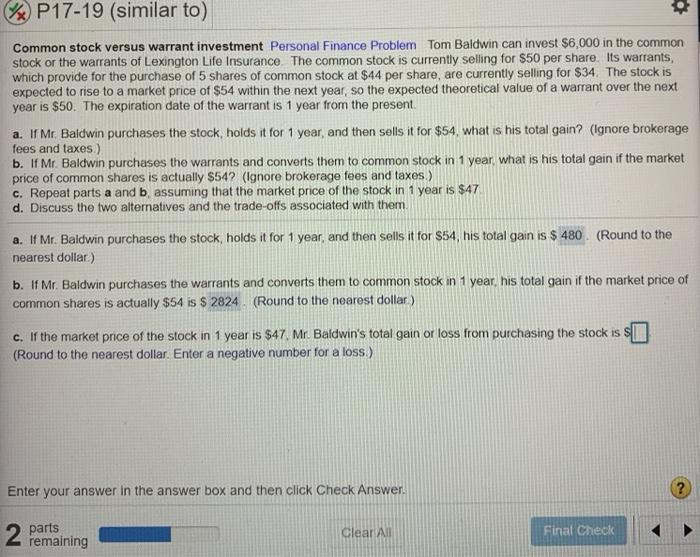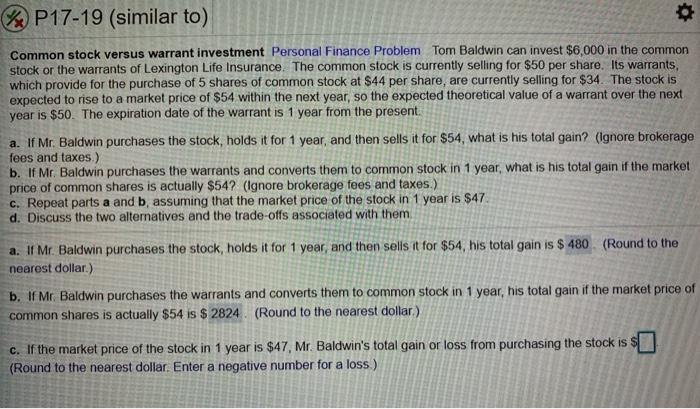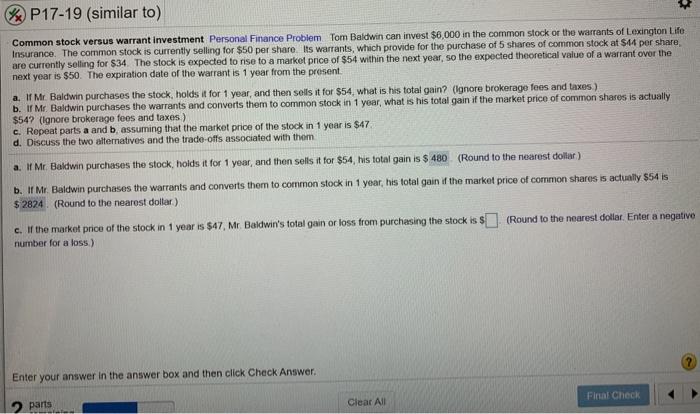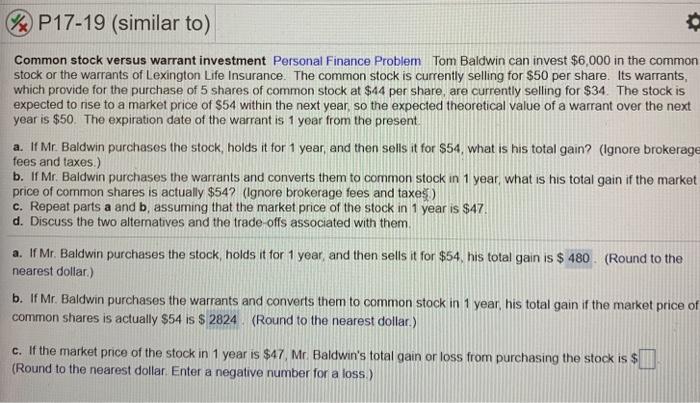W P17-19 (similar to) Common stock versus warrant investment Personal Finance Problem Tom Baldwin can invest $6,000 in the common stock or the warrants of Lexington Life Insurance. The common stock is currently selling for $50 per share. Its warrants, which provide for the purchase of 5 shares of common stock at $44 per share are currently selling for $34. The stock is expected to rise to a market price of $54 within the next year, so the expected theoretical value of a warrant over the next year is $50. The expiration date of the warrant is 1 year from the present a. If Mr. Baldwin purchases the stock, holds it for 1 year, and then sells it for $54, what is his total gain? (Ignore brokerage fees and taxes.) b. If Mr. Baldwin purchases the warrants and converts them to common stock in 1 year what is his total gain if the market price of common shares is actually $54? (Ignore brokerage fees and taxes.) c. Repeat parts a and b, assuming that the market price of the stock in 1 year is $47 d. Discuss the two alternatives and the trade-offs associated with them a. If Mr. Baldwin purchases the stock, holds it for 1 year, and then sells it for $54, his total gain is $ 480 (Round to the nearest dollar) b. If Mr. Baldwin purchases the warrants and converts them to common stock in 1 year, his total gain if the market price of common shares is actually $54 is $ 2824. (Round to the nearest dollar) c. If the market price of the stock in 1 year is $47. Mr. Baldwin's total gain or loss from purchasing the stock is s (Round to the nearest dollar. Enter a negative number for a loss) Enter your answer in the answer box and then click Check Answer. 2 parts Clear All Final Check remaining P17-19 (similar to) Common stock versus warrant investment Personal Finance Problem Tom Baldwin can invest $6,000 in the common stock or the warrants of Lexington Life Insurance. The common stock is currently selling for $50 per share. Its warrants, which provide for the purchase of 5 shares of common stock at $44 per share, are currently selling for $34. The stock is expected to rise to a market price of $54 within the next year, so the expected theoretical value of a warrant over the next year is $50. The expiration date of the warrant is 1 year from the present. a. If Mr. Baldwin purchases the stock, holds it for 1 year, and then sells it for $54, what is his total gain? (Ignore brokerage fees and taxes.) b. If Mr. Baldwin purchases the warrants and converts them to common stock in 1 year, what is his total gain if the market price of common shares is actually $54? (Ignore brokerage fees and taxes.) c. Repeat parts a and b, assuming that the market price of the stock in 1 year is $47 d. Discuss the two alternatives and the trade-offs associated with them a. If Mr. Baldwin purchases the stock, holds it for 1 year, and then sells it for $54, his total gain is $ 480 (Round to the nearest dollar) b. If Mr Baldwin purchases the warrants and converts them to common stock in 1 year, his total gain if the market price of common shares is actually $54 is $ 2824 (Round to the nearest dollar) c. If the market price of the stock in 1 year is $47, Mr. Baldwin's total gain or loss from purchasing the stock is $ (Round to the nearest dollar. Enter a negative number for a loss) W P17-19 (similar to) Common stock versus warrant investment Personal Finance Problem Tom Baldwin can invest $6,000 in the common stock or the warrants of Lexington Life Insurance. The common stock is currently selling for $50 per share. Its warrants, which provide for the purchase of 5 shares of common stock at $14 per share are currently selling for $34. The stock is expected to rise to a market price of $54 within the next year, so the expected theoretical value of a warrant over the next year is $50. The expiration date of the warrantis 1 year from the present a. Mr. Baldwin purchases the stock, holds it for 1 year, and then sells it for $54, what is his total gain? (Ignore brokerage foes and taxes) b. Mr Baldwin purchases the warrants and converts them to common stock in 1 year, what is his total gain if the market price of common shares is actually $549 (Ignore brokerage foes and taxes ) c. Repeat parts a and b, assuming that the market price of the stock in 1 year is $47 d. Discuss the two alternatives and the trade-offs associated with them a. If Mr. Baldwin purchases the stock, holds it for 1 year, and then sells it for $54, his total gain is $ 480 (Round to the nearest dollar) b. If Mr. Baldwin purchases the warrants and converts them to common stock in 1 year, his total gain if the market price of common shares is actually $54 is $ 2824 (Round to the nearest dollar) c. If the market price of the stock in 1 year is $47, Mr Baldwin's total gain or loss from purchasing the stock is $(Round to the nearest dollar. Enter a negative number for a loss.) Enter your answer in the answer box and then click Check Answer. Final Check parts Clear All 2 P17-19 (similar to) Common stock versus warrant investment Personal Finance Problem Tom Baldwin can invest $6,000 in the common stock or the warrants of Lexington Life Insurance. The common stock is currently selling for $50 per share. Its warrants, which provide for the purchase of 5 shares of common stock at $44 per share are currently selling for $34. The stock is expected to nse to a market price of $54 within the next year, so the expected theoretical value of a warrant over the next year is $50. The expiration date of the warrant is 1 year from the present a. If Mr. Baldwin purchases the stock, holds it for 1 year, and then sells it for $54, what is his total gain? (Ignore brokerage fees and taxes.) b. If Mr. Baldwin purchases the warrants and converts them to common stock in 1 year, what is his total gain if the market price of common shares is actually $54? (Ignore brokerage fees and taxes) C. Repeat parts a and b, assuming that the market price of the stock in 1 year is $47. d. Discuss the two alternatives and the trade-offs associated with them a. If Mr. Baldwin purchases the stock, holds it for 1 year and then sells it for $54. his total gain is $ 480 (Round to the nearest dollar) b. If Mr. Baldwin purchases the warrants and converts them to common stock in 1 year, his total gain if the market price of common shares is actually $54 is $ 2824. (Round to the nearest dollar.) c. If the market price of the stock in 1 year is $47, Mr Baldwin's total gain or loss from purchasing the stock is $ II (Round to the nearest dollar. Enter a negative number for a loss)










